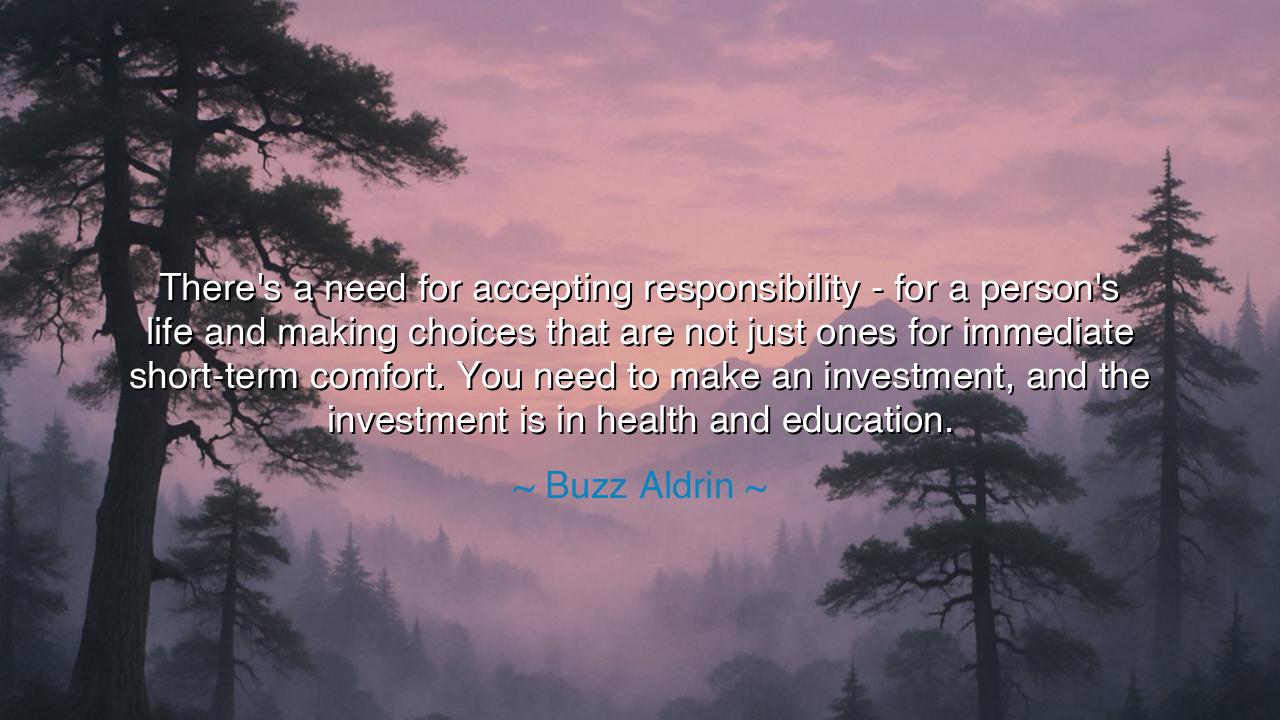
There's a need for accepting responsibility - for a person's life
There's a need for accepting responsibility - for a person's life and making choices that are not just ones for immediate short-term comfort. You need to make an investment, and the investment is in health and education.





In the solemn and steady voice of a man who once walked among the stars, Buzz Aldrin spoke these words of grounded wisdom: “There’s a need for accepting responsibility — for a person’s life and making choices that are not just ones for immediate short-term comfort. You need to make an investment, and the investment is in health and education.” Though he was a voyager beyond the Earth, his message was not about the heavens but about the foundations of human life itself. For what use is it to reach the moon, he reminds us, if we have not learned to master ourselves, to tend to our bodies and minds, and to build a life rooted in purpose and endurance rather than ease?
Buzz Aldrin, one of the first men to set foot upon the lunar surface, understood better than most that greatness is never achieved by chance or comfort. His path to the stars was paved with discipline, sacrifice, and preparation — the very essence of responsibility. When he spoke of making choices beyond “immediate short-term comfort,” he was speaking from the perspective of one who knew that every success, whether personal or collective, is born of long-term vision. The great journeys of life, he teaches, are not measured in miles but in commitment — the commitment to prepare, to endure, and to choose growth over gratification.
The ancients would have recognized Aldrin’s wisdom as kin to their own. The philosopher Aristotle once wrote that the highest good lies not in pleasure but in excellence of character, cultivated through effort and reason. Likewise, Aldrin’s call for “accepting responsibility” is the modern echo of the Stoic teaching that one’s life is one’s own to shape — that virtue lies in mastery over the self. To invest in health and education, as Aldrin commands, is to invest in the twin pillars of human greatness: the body and the mind. For without health, the body becomes a cage; without education, the mind becomes a prison.
In these words lies not only philosophy but lived truth. Aldrin, like all explorers, knew the fragility of the human form and the necessity of preparation. His voyage to the moon was a triumph of discipline, not mere daring. He and his fellow astronauts devoted years to rigorous physical and intellectual training. Every heartbeat, every breath, every decision had to be sharpened through responsibility and knowledge. To walk upon the lunar dust required not only courage but mastery — mastery of the body, the intellect, and the will. Thus his wisdom comes not from theory but from experience: he had lived what he taught.
Consider, too, how his words apply to all who walk the earth, not just those who venture beyond it. Many seek comfort in the present, neglecting the foundation of their future. They indulge rather than prepare, and in doing so, they trade potential for ease. Yet history has always honored those who chose the harder path — the scholars who studied through hunger, the healers who endured long nights to serve others, the pioneers who built civilizations not for themselves alone but for those who would follow. Responsibility, as Aldrin reminds us, is not a burden but a sacred duty — the act of shaping one’s life as an offering to the future.
Aldrin’s emphasis on investment speaks with particular force. He does not speak of wealth in coins or gold, but of the deeper riches of health and education. To invest in health is to respect the vessel that carries you through life — to treat the body not as a tool for pleasure, but as a temple of purpose. To invest in education is to feed the mind, to strengthen its reason, imagination, and wisdom. Both are long-term pursuits; both demand patience. Yet they yield rewards that no fleeting indulgence can rival: vitality, freedom, and understanding. These are the true measures of prosperity.
Let this, then, be the lesson drawn from Aldrin’s words: Seek not the comfort of the moment, but the strength of a lifetime. Choose the path that nourishes, not the one that numbs. Tend your body as a warrior tends his armor, and your mind as a sage tends his garden. Remember that every choice, however small, is a step toward the future you are building. When the world tempts you with ease, recall that even the man who stood on the moon began with small, patient steps upon the Earth.
And so, as the ancients would counsel, honor yourself through discipline and learning, for these are the roots of freedom. Embrace responsibility as your companion, not your foe. For in doing so, you claim the power to rise — not just to great heights, but to great purpose. This is the essence of Aldrin’s message: that the human spirit, disciplined by responsibility and strengthened by knowledge, can transcend not only the limits of the world, but the limits of the self.






AAdministratorAdministrator
Welcome, honored guests. Please leave a comment, we will respond soon